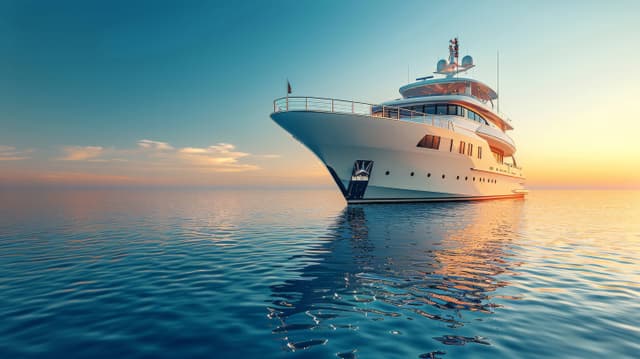Boat Depreciation Calculator: Understanding the True Value of Your Vessel

When it comes to owning a boat, understanding its depreciation is just as important as the thrill of sailing it. Depreciation affects the resale value, insurance costs, and overall financial planning associated with your vessel. In this article, we will delve into the intricacies of boat depreciation, explain how to use a boat depreciation calculator, and help you make informed decisions about your investment.
Table of Contents
- Introduction
- Importance of Understanding Boat Depreciation
- What is Boat Depreciation?
- Factors Affecting Boat Depreciation
- How to Calculate Boat Depreciation
- Depreciation Examples by Boat Type
- The Role of Upgrades and Modifications
- How to Minimize Boat Depreciation
- Boat Depreciation and Insurance
- Frequently Asked Questions (FAQs)
- Conclusion
Introduction
When you purchase a boat, you're not just buying a vessel; you're making an investment. However, like any investment, boats depreciate over time. This depreciation impacts the resale value and can affect your financial planning. Whether you're a seasoned boat owner or a first-time buyer, understanding how depreciation works is crucial.
What is Boat Depreciation?
Boat depreciation refers to the reduction in the boat's value over time due to factors like age, wear and tear, and market conditions. Just like cars, boats lose value the moment they are taken out of the showroom. However, the rate of depreciation can vary based on several factors, which we'll explore in detail.
Factors Affecting Boat Depreciation
Age of the Boat
One of the most significant factors influencing a boat's depreciation is its age. Newer boats tend to lose value more quickly in the first few years, followed by a more gradual decline. This initial steep drop is similar to what happens with cars, where the value can decrease by 20-30% within the first year.
Condition and Maintenance
A well-maintained boat will depreciate slower than one that has been neglected. Regular maintenance, including engine servicing, cleaning, and addressing wear and tear, can preserve the boat's value. Boats with detailed maintenance records are more attractive to buyers, which can also slow down depreciation.
Make and Model
Certain makes and models hold their value better than others. High-quality, reputable brands with a history of reliability tend to depreciate at a slower rate. On the other hand, lesser-known brands or models that have been discontinued might lose value faster.
Market Demand
The demand for specific types of boats can fluctuate based on trends, economic conditions, and regional preferences. For example, powerboats might be in higher demand in coastal regions, while sailboats could be more popular in inland lakes. Market demand plays a critical role in determining how quickly a boat depreciates.
How to Calculate Boat Depreciation
Understanding Depreciation Rates
Depreciation rates can vary significantly depending on the factors mentioned earlier. On average, a new boat may depreciate between 5% to 10% per year. However, the first few years often see the most substantial drop in value.
Using a Boat Depreciation Calculator
Inputting Relevant Data
When using a boat depreciation calculator, you'll need to provide specific details about your boat. These typically include the purchase price, the age of the boat, its current condition, and any upgrades or modifications you've made. Accurate data input is essential for getting reliable results.
Analyzing the Results
After entering all the relevant information, the calculator will provide you with an estimated depreciation rate and the current value of your boat. This information can be incredibly useful when planning to sell or upgrade your vessel.
Depreciation Examples by Boat Type
Powerboats
Powerboats, including speedboats and fishing boats, tend to depreciate rapidly in the first few years. However, if well-maintained, they can hold their value relatively well compared to other types.
Sailboats
Sailboats often have a slower depreciation rate, especially if they are classic models or from well-known brands. Their appeal to a niche market can help maintain their value.
Yachts
Yachts, especially luxury models, experience significant depreciation in the first few years. However, their value can stabilize over time, particularly for those in excellent condition with high-end amenities.
Personal Watercraft
Personal watercraft, like Jet Skis, typically depreciate faster due to their lower initial cost and the wear and tear associated with frequent use. However, models from reputable brands can retain value better.
The Role of Upgrades and Modifications
Impact on Resale Value
Upgrades and modifications can either increase or decrease the resale value of a boat. High-quality upgrades, such as installing advanced navigation systems or enhancing the interior, can make the boat more appealing to buyers. However, overly personalized modifications might deter potential buyers.
Smart Investments in Boat Upgrades
If you're planning to upgrade your boat, consider the long-term impact on its value. Focus on upgrades that enhance functionality, safety, and comfort, as these are more likely to provide a return on investment when it's time to sell.
How to Minimize Boat Depreciation
Regular Maintenance
Regular maintenance is key to preserving your boat's value. Routine checks on the engine, hull, and other critical components can prevent issues from escalating and keep the boat in top condition.
Proper Storage
Proper storage, especially during the off-season, can significantly reduce wear and tear. Storing your boat in a climate-controlled facility or using a high-quality cover can protect it from the elements and slow down depreciation.
Choosing the Right Boat Type
Certain boat types depreciate slower than others. For example, well-built sailboats or yachts from reputable brands might hold their value better than less expensive, mass-produced models.
Timing the Market for Sale
The timing of your sale can also impact how much you get for your boat. Selling during peak boating season when demand is high can help you get a better price. Additionally, monitoring market trends can give you an idea of the best time to sell.
Boat Depreciation and Insurance
How Depreciation Affects Insurance Premiums
As your boat depreciates, the insurance premiums may decrease because the boat's replacement cost is lower. However, it's essential to review your policy regularly to ensure it reflects the current value of your boat.
Understanding Agreed Value vs. Actual Cash Value Policies
There are two main types of boat insurance policies: agreed value and actual cash value. An agreed value policy will pay out a predetermined amount in the event of a total loss, regardless of depreciation. In contrast, an actual cash value policy takes depreciation into account, which could result in a lower payout.
Conclusion
Understanding boat depreciation is crucial for making informed decisions about buying, maintaining, and selling your vessel. By using a boat depreciation calculator and considering factors like age, condition, and market demand, you can better predict your boat's future value and make strategic choices to minimize depreciation.
Frequently Asked Questions (FAQs)
How quickly does a boat lose value?
A boat can lose 20-30% of its value within the first year of purchase, with the rate of depreciation slowing down in subsequent years.
Can I prevent my boat from depreciating?
While you can't stop depreciation entirely, regular maintenance, proper storage, and making smart upgrades can help slow it down.
Does the location of the boat affect its depreciation?
Yes, the location can impact depreciation. Boats in saltwater environments may depreciate faster due to the harsher conditions compared to freshwater environments.
How does depreciation impact financing a boat?
Depreciation can affect the loan-to-value ratio, potentially requiring you to put down a larger deposit or influencing the terms of your loan.
Is it better to buy a new or used boat considering depreciation?
Buying a used boat can be more cost-effective as it has already gone through the steepest part of its depreciation curve. However, new boats offer the latest features and warranties.


